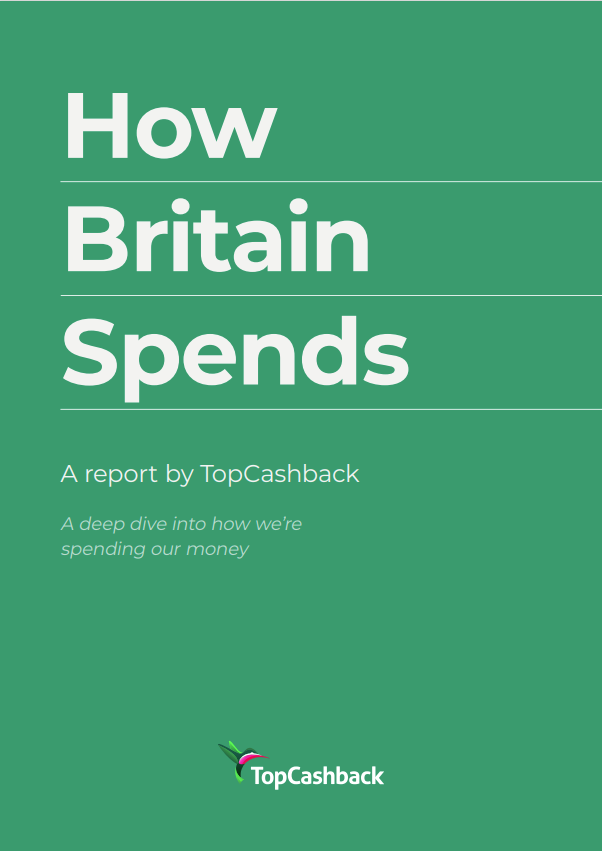Date published: September 25th 2023
A recent study by TopCashback has found that 41% of people feel anxious about the cost of living on a weekly basis.
When it comes to our spending, 10% of adults in the UK are spending beyond their means for more than half the year, with 17% having £0 or less in their current account the day before payday during an average month.
What is the How Britain Spends report?
Here at TopCashback, we've recently launched a brand-new report delving into the nation’s spending habits.
The How Britain Spends report is a culmination of research and analysis into real-time shopping trends. We were interested in finding out about what we buy, how often we buy and how much we buy. But as well as this, we were also keen to hear about how people across the UK felt about their spending habits and financial health overall.
All of our facts and figures are backed by retail data to give a clear snapshot of how Britain shops today. Our aim? To open up the conversation about personal finances with our TopCashback members and Money Guides readers.
With autumn being a very expensive time of year for families, our first report also includes a spotlight on family finances. We asked parents how they’re managing to meet the financial demands of raising children, as well as their thoughts about talking to their kids about money.
You can read the full report here, but for a summary of some of the highlights, keep scrolling.
Our financial health in September 2023
We spoke to thousands of people in Britain about their current financial situation and how they felt about it.
Our study found that, on average, people spend beyond their means for 2.5 months out of the year. The average adult has £323 remaining in their current account the day before payday, while 17% of adults have nothing in their current account, or are in their overdraft, the day before payday.
Despite how many of us are living from paycheck to paycheck, the majority of people we surveyed (66%) said they felt that their spending was under control.
However, when it comes to the cost of living, 41% of people said they felt anxious about it on a weekly basis. 25% of people also said they felt overwhelmed by the cost of living, and 17% said they felt scared.
How we spend our money
When it comes to how we spend our money, factors such as our age can have a big influence. Our research found that adults in their 40s spend the most on mortgages, 18 and 19-year-olds splurge the most on takeaways and meals out, and childcare is the biggest expenditure for people in their 20s and 30s.
As a nation, we’ve been spending more on essential items like groceries and toiletries. Over the last three months, we’ve spent…
41% more on essential groceries
24% more on essential toiletries
23% more on petrol
19% more on pet care and pet food
16% more on essential clothing

When it comes to non-essential, seasonal and luxury spending, the UK has spent the most on the following categories over the past three months:



During the same time period, the biggest increases in seasonal and luxury spending have been on:



We're proud to have The Money Charity as TopCashback's charity partner. We spoke to their Chief Executive, Michelle Highman, about our findings:
‘The ongoing cost-of-living crisis has continued to test both the financial wellbeing and resilience of households across the UK… What’s clear from this latest research is that the large rise in spending on essentials, whether that’s food, transport, or clothing is likely to have impacted the ability to focus on much beyond the necessities.’
Tips from a personal finance expert:
Personal finance expert Sue Hayward has some handy tips for anyone looking to stretch their money further when it comes to seasonal spending:

Shop around at the start of each season to try and save money stocking up on items you want to buy in the months ahead like birthday presents, instead of making costly impulse buys. Check online money-saving sites to find out about the latest discounts, cashback, vouchers and offers available.

Many offer discounts on your first meal or purchase along with seasonal offers with newsletters, vouchers and discounts. If you don’t want these emails clogging up your inbox, you can always set up a separate email account or unsubscribe once you’ve made the most of the deal or offer.

Loyalty rarely pays and switching your mobile, broadband and insurance to get better deals can all help save money towards any increase in your seasonal spending. Get into the habit of shopping around and use price comparison sites and other online services to help find better deals.
TopCashback staff tips:
We asked some of our colleagues at TopCashback whether they had any tips for making money stretch further when it comes to spending money on non-essential items. Here's what we found:
Georgia:
“I’ve started my Christmas shopping very early this year to try to make sure I don’t cut myself short as we get closer to December. Beauty advent calendars are particularly great for regifting or even for use as stocking fillers. I know some people (myself included) who start Christmas shopping as early as the summer sales.”
Clare:
"I buy presents for my young nieces' and nephews’ birthdays ahead of time in the post-Christmas sales. This enables me to buy a better quality present for the same amount of money I’d spend if I was buying nearer the time, whether it’s clothes or toys. I also do this for other relatives who have birthdays earlier in the year.
Another trick I use for making the most of post-Christmas sales is to save up my Boots Advantage points until this time of year."
Family spending in September 2023
With 33% of parents saying they felt anxious about the cost of living on a weekly basis, it’s clear there’s a lot of pressure on families to find ways to make ends meet.
Our first report shines a light on what families spend on the day-to-day upkeep of the family and household.
The essentials
- Feeding the family costs an average of £6,224 per year.
- Parents are spending an average of £30 on school lunches every week, which adds up to £1,560 a year.
- Of the biggest essential expenses from the last three months, school uniform came out in fourth place with an average spend of £120.
- Parents also spent an average of £90 on school equipment for their children.
The majority of parents we surveyed said they had spent more money in the last three months. The top reasons for this were the cost of living, large unexpected costs, the cost of going on holiday and paying for birthday celebrations.

Treats and entertainment
- The average family spends £28 every week on parties, presents and cinema trips.
- An extra £30 a week is spent on extracurricular activities.
- Parents are spending an average of £26 per week on pocket money.
Talking to kids about money
55% of parents who have children aged 18 and over haven’t spoken to them about the cost of living, while 31% of parents said they don’t talk to their children about money at all.
The most common conversations being had between parents and their kids about money are about the cost of things, saving for the future and bills.
If you’d like to get better at talking to your children about finances, here are a few helpful tips.
 Give them some responsibility
Give them some responsibility
Nothing teaches us better than experience, and giving your kids the chance to have some financial responsibility can be a great way to open up the conversation about money. Why not set your teenager the task of budgeting for your family’s weekly food shop?
 Find ways to make money talk accessible
Find ways to make money talk accessible
Your approach to talking to your children about money will need to be informed by how old they are. If you don’t know where your children are at when it comes to their understanding of money, it can be hard to know how to open up the conversation. This is why the best place to start is just by asking questions. Let them guide what you talk about and see what you both learn.

 Get into the habit of talking about money
Get into the habit of talking about money
If you can make conversations about money a natural occurrence in your household, your kids will feel more confident coming to you with their questions and worries. The more you do it, the more you’ll find that it becomes easy to relate topics back to money. Whether you’re renewing your car insurance, doing the grocery shop, or buying a new sofa, try getting your kids involved in these discussions.
 Try to find positives
Try to find positives
In the current climate, a lot of us are worrying about our finances. But while it’s great to open up the conversation about money with our kids, focusing on the negatives can cause them to worry. Even when things aren’t good, there will be something positive you can find to talk about. For example, sticking to your budget at the supermarket or finding a second hand bargain online — those are both wins.
What can we take away from TopCashback's first How Britain Spends report?
It’s clear to see that the current financial climate in the UK is causing a lot of people to feel high levels of worry and stress.
There’s a lot of pressure on individuals, especially parents, to find ways to make ends meet, with many of us being forced to reassess how we prioritise our spending and plan for the future.
However, it’s important to remember that you are not alone. If you’re struggling with your finances and need support or advice, there are organisations that can help. Citizens Advice, National Debtline and StepChange all provide free help, including practical advice to make small positive changes to ease the financial pressure.
You can read TopCashback's first How Britain Spends report in full here.

